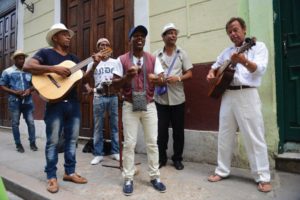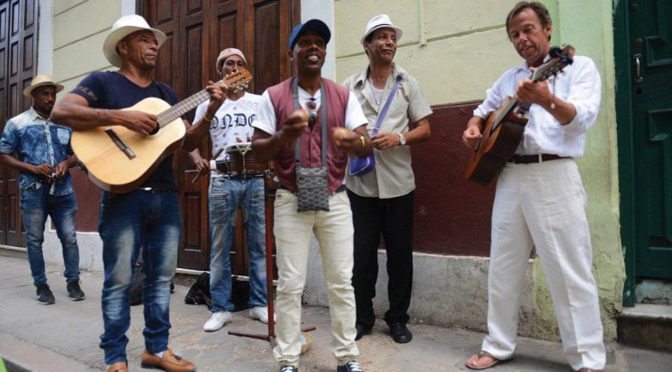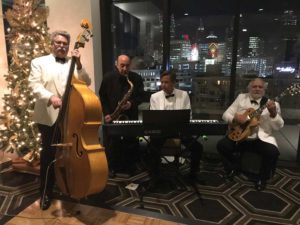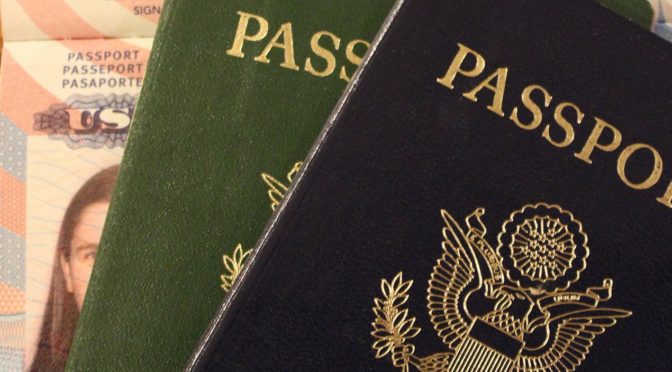
Local 5 (Detroit, MI) member Ed Zelenak (far right) plays with Cuban street musicians near the Ambos Mundos Hotel in Old Havana, where Ernest Hemingway famously stayed and wrote some of his most celebrated novels.
“My father taught me the old standards, swing, and Latin-influenced music,” says guitarist Ed Zelenak of Local 5 (Detroit, MI), adding that it served him well on his 2017 visit to Cuba. He seized upon the opportunity to visit the island when the US embargo was lifted.
In Old Havana, it’s not uncommon to find American and Cuban musicians casually playing together on the streets. Drawing on the dance music his father taught him, he says, “I fit right in with these guys. Playing with Cuban musicians, we were kindred spirits—I felt like we were soul mates.”
Havana’s Splendor
The streets and alleys of the city virtually echo with the sounds of Nat King Cole, The Beatles, Sam Cooke, and the Eagles. “People want to hear Hank Williams, Bob Marley, Four Tops, nothing modern,” Zelenak says. Cuba is a dual society—boasting old world architecture, art galleries, swanky hotels, and famous performing arts venues. But music is as rich a tradition in the streets and with the average person. “If I were in Cuba today, I’d be a street musician, instead of playing in a concert hall.”
Although the country is slowly becoming unfiltered—WiFi is only available in a handful of public spaces—journalists, artists, and musicians have become creative in gaining access to the world. Cubans’ relationship to music is unique. It’s continuous, Zelenak says. “Long after the band packs up after playing in front of the bars and restaurants, you can hear them singing on their way home.” They play more traditional instruments, like the three-string guitar, the classic tres guitar, horns and trumpets, and Cuban percussion instruments—some more primitive than others. He says, “They’ll play sound effects on cow skulls.”
Union Family
Zelenak, whose entire family had been involved in the union and Local 5 from the 1920s—now including his son Elliott—says, “In my street travels, I spent a lot of time talking to musicians and writers about unions and getting compensated. Many talked about secret associations—informal groups that meet to support each other. Unions are still a long way off. The objective one day would be to set up rates for performers.”
At this point, the money musicians make, he explains, is tied to the restaurant industry. “On almost every corner, there’s a band playing; they’re there every night. They’d roll a piano out. Guys would have trumpets and trombones. They’re there to attract business.”
Although the conversations about unions seemed promising, he says musicians with whom he corresponded were reluctant to continue the dialogue. In addition, Trump Administration initiatives to restrict commerce between the two nations may destroy hopes of organizing, he says.
Zelenak was introduced to music by his father who had a big band post WWII in which the teenage Zelenak played guitar and piano. It was a meaningful way for father and son to connect, but one that ended abruptly when his father died. Zelenak was only 18 years old. Music helped him survive the loss of his father, but also provided a practical motivation. He took over his father’s band, which comprised two of his three brothers. Playing gigs at night, eventually he managed to put himself through law school.
Today, he still leads two bands, a nine-piece dance band called Little Davy and the Diplomats (minus his brother Dave Zelenak, who is now a judge) and a four-piece combo with fellow Local 5 members Ted Blankenship, George Katsakis, and Al Ayoub.
Music Pays Off
Throughout a busy law career, he continued to pursue music. Recently, Zelenak tried his hand at country music (with a lawyerly spin) penning the song “Repossess My Love.” Several years ago, he wrote “Oblique Samba,” which he describes as a contemporary version of “The Girl from Ipanema”—the story of a street musician serenading a cleaning woman at a hotel in Old Havana. He got the opportunity to introduce the song in Cuba first on the street with other musicians and then at the Hotel Santa Isabella where it was warmly received.
“They just love talking about music, from the hotel clerks and bellmen to women working in the rooms. Music is something everybody loves there,” he says.
Nowadays, he plays a lot of hotel lobbies, which he prefers, saying, “It’s restoring the personal touch of live music. I’ve played in hotels all over the world.”
In fact, Zelenak just returned from Jamaica, where he performs every New Year’s Eve at the Day-O Plantation with legendary reggae and calypso artists Paul Hurlock, Ernie Smith, and Cabot Paul, all members of the Jamaica Federation of Musicians. Although he would love to return to Cuba, with stricter regulations in place, one needs State Department approval. In the meantime, he says, he’ll be in Los Angeles and then Paris in the spring.
“I look at my approach to music as a dual language—romance—both in the writing, the lyrics, and the performing.” He recalls what his son once said to him, “Music is an international handshake.” Zelenak adds, “You don’t have to speak their language, music does all the talking.”




